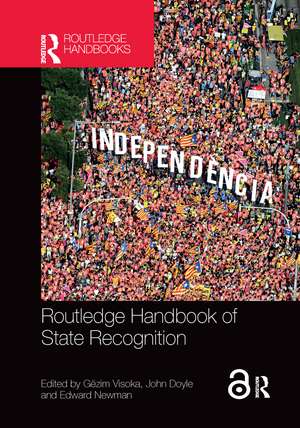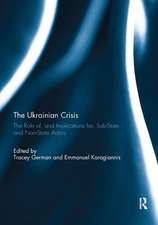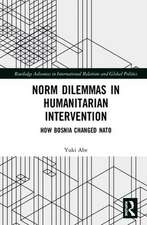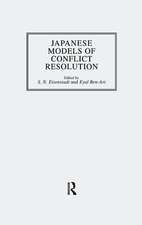Routledge Handbook of State Recognition
Editat de Gëzim Visoka, John Doyle, Edward Newmanen Limba Engleză Paperback – 30 sep 2021
Although the recognition of states plays a central role in shaping global politics, it remains an under-researched and widely dispersed subject. Coherently and innovatively structured, the handbook brings together a group of international scholars who examine the most important theoretical and comparative perspectives on state recognition, including debates about pathways to secession and self-determination, the broad range of actors and strategies that shape the recognition of states and a significant number of contemporary case studies.
The handbook is organised into four key sections:
- Theoretical and normative perspectives
- Pathways to independent statehood
- Actors, forms and the process of state recognition
- Case studies of contemporary state recognition
This handbook will be of great interest to students of foreign policy, international relations, international law, comparative politics and area studies.
Chapter 19 of this book is freely available as a downloadable Open Access PDF under a Creative Commons Attribution-Non Commercial-No Derivatives 4.0 license https://www.routledge.com/Routledge-Handbook-of-State-Recognition/Visoka-Doyle-Newman/p/book/9780815354871
| Toate formatele și edițiile | Preț | Express |
|---|---|---|
| Paperback (1) | 431.84 lei 6-8 săpt. | |
| Taylor & Francis – 30 sep 2021 | 431.84 lei 6-8 săpt. | |
| Hardback (1) | 1195.28 lei 6-8 săpt. | |
| Taylor & Francis – 23 sep 2019 | 1195.28 lei 6-8 săpt. |
Preț: 431.84 lei
Nou
Puncte Express: 648
Preț estimativ în valută:
82.66€ • 89.82$ • 69.48£
82.66€ • 89.82$ • 69.48£
Carte tipărită la comandă
Livrare economică 21 aprilie-05 mai
Preluare comenzi: 021 569.72.76
Specificații
ISBN-13: 9781032177274
ISBN-10: 1032177276
Pagini: 520
Dimensiuni: 174 x 246 x 27 mm
Greutate: 0.82 kg
Ediția:1
Editura: Taylor & Francis
Colecția Routledge
Locul publicării:Oxford, United Kingdom
ISBN-10: 1032177276
Pagini: 520
Dimensiuni: 174 x 246 x 27 mm
Greutate: 0.82 kg
Ediția:1
Editura: Taylor & Francis
Colecția Routledge
Locul publicării:Oxford, United Kingdom
Public țintă
Postgraduate, Professional, and UndergraduateCuprins
1. Introduction: Statehood and Recognition in World Politics Gëzim Visoka, Edward Newman, and John Doyle PART I: Theoretical and Normative Perspectives 2. Theories of State Recognition Rowan Nicholson and Thomas D. Grant 3. The Evolution of State Recognition Mikulas Fabry 4. International Law and State Recognition Peter Radan 5. Sovereignty, Self-determination, and State Recognition Costas Laoutides 6. The Ethics of State Recognition Christopher Naticchia 7. Power Politics and State Recognition Milena Sterio 8. International Recognition and Human Rights Treaties Ralph Wilde 9. State Recognition in a Transitional International Order Edward Newman PART II: Pathways to Independent Statehood 10. Pathways to Independence and State Recognition James Summers 11. Dynamics of Secession and State Birth Ryan Griffiths 12. Referendums and Recognition of States Matt Qvortrup 13. Unilateral Secession Aleksandar Pavković 14. Remedial Secession Michel Seymour PART III: Actors, Forms, and the Process of State Recognition 15. Bilateral Recognition of States Brad R. Roth 16. Recognition of Governments M.J. Peterson 17. Statehood and Collective Recognition: Practice of States and UN Organs Jure Vidmar 18. Collective Non-Recognition of States Nina Caspersen 19. Engagement Without Recognition Bruno Coppieters 20. Parliamentary Recognition Chiara Loda and John Doyle 21. Recognition of States by Regional Organisations: The European Union’s Contested Experience Gëzim Visoka and Edward Newman 22. International Court of Justice and the Recognition of States Gentian Zyberi 23. The Counter-Diplomacy of State Recognition James Ker-Lindsay 24. State Fragility and Diplomatic Recognition Nicolas Lemay-Hébert 25. The Derecognition of States Gëzim Visoka 26. Contested States and their Everyday Quest for Recognition Dimitris Bouris and Irene Fernandez-Molina Part IV: Case Studies of Contemporary State Recognition 27. Palestine Yaser Alashqar 28. Taiwan Timothy S. Rich and Andi Dahmer 29. Western Sahara Irene Fernandez-Molina and Matthew Porges 30. South Sudan Walt Kilroy 31. Kosovo Gëzim Visoka 32. Somaliland Scott Pegg 33. Abkhazia and South Ossetia Donnacha Ó Beacháin 34. Transdniestria and Northern Cyprus Daria Isachenko 35. Brexit and the Question of Irish Unity Eileen Connolly and John Doyle 36. Towards a Critical Agenda on State Recognition Gëzim Visoka
Notă biografică
Gëzim Visoka is Assistant Professor of Peace and Conflict Studies at Dublin City University, Ireland.
John Doyle is Executive Dean of the Faculty of Humanities and Social Sciences and Director of the Institute for International Conflict Resolution and Reconstruction at Dublin City University, Ireland.
Edward Newman is a Professor of International Security in the School of Politics and International Studies at the University of Leeds, UK.
Recenzii
'The most comprehensive review of the highly relevant and contested doctrine and practice on recognition - a magnificent resource for years to come.'- Marc Weller, University of Cambridge, UK.
'The Routledge Handbook of State Recognition offers a unique and valuable collection of contributions to the study of the theory and practice of state recognition that ventures far beyond the traditional concerns of international law. A truly interdisciplinary work that integrates a wide range of theoretical and empirical perspectives on recognition, this handbook should be of great value to scholars and advanced students of international relations, political theory and international law.' - Jens Bartelson, Lund University, Sweden
'This handbook examines how and why the world's political map changes. Gathering experts from multiple fields, it is the best single collection on how certain new states get recognised and how other aspiring states exist in a grey zone, unrecognised on the map but unavoidable on the ground.' - Gerard Toal, Virginia Tech, Washington DC, USA
'The politics of recognition form the core of the state-based international order and its evolution. In this volume, Visoka, Doyle and Newman assemble a top-notch group of scholars with diverse theoretical perspectives and expertise. The resulting conversation, and the handbook, is more than the sum of its parts. It is perhaps even more important, however, for its timeliness as conflicts on the mend are newly raw, cold conflicts are becoming more violent and ever more discontents consider demanding unilateral independence.' - Bridget Coggins, University of California, Santa Barbara, USA
'The Routledge Handbook of State Recognition makes a unique contribution to the literature on state recognition. The editors aim to address a wide audience, as the handbook offers a comprehensive and multidisciplinary take on the theoretical and empirical aspects of state recognition. While the recognition of states influences and shapes the international system, the theory and practice of state recognition remain on the margins. The handbook will therefore be of great interest to scholars, researchers and students working in fields as varied as International Relations, foreign policy, area studies and international law. There is plenty to dwell on and appreciate in this handbook.'--International Affairs, 97, 1, January 2021
'...the volume is an excellent and complete resource for anyone who wants to understand the legal basis, processes, and dynamics of state recognition, including its challenges and main critiques'. -- Ana Carina S. Franco, Journal of Intervention and Statebuilding, July 2022
'The Routledge Handbook of State Recognition offers a unique and valuable collection of contributions to the study of the theory and practice of state recognition that ventures far beyond the traditional concerns of international law. A truly interdisciplinary work that integrates a wide range of theoretical and empirical perspectives on recognition, this handbook should be of great value to scholars and advanced students of international relations, political theory and international law.' - Jens Bartelson, Lund University, Sweden
'This handbook examines how and why the world's political map changes. Gathering experts from multiple fields, it is the best single collection on how certain new states get recognised and how other aspiring states exist in a grey zone, unrecognised on the map but unavoidable on the ground.' - Gerard Toal, Virginia Tech, Washington DC, USA
'The politics of recognition form the core of the state-based international order and its evolution. In this volume, Visoka, Doyle and Newman assemble a top-notch group of scholars with diverse theoretical perspectives and expertise. The resulting conversation, and the handbook, is more than the sum of its parts. It is perhaps even more important, however, for its timeliness as conflicts on the mend are newly raw, cold conflicts are becoming more violent and ever more discontents consider demanding unilateral independence.' - Bridget Coggins, University of California, Santa Barbara, USA
'The Routledge Handbook of State Recognition makes a unique contribution to the literature on state recognition. The editors aim to address a wide audience, as the handbook offers a comprehensive and multidisciplinary take on the theoretical and empirical aspects of state recognition. While the recognition of states influences and shapes the international system, the theory and practice of state recognition remain on the margins. The handbook will therefore be of great interest to scholars, researchers and students working in fields as varied as International Relations, foreign policy, area studies and international law. There is plenty to dwell on and appreciate in this handbook.'--International Affairs, 97, 1, January 2021
'...the volume is an excellent and complete resource for anyone who wants to understand the legal basis, processes, and dynamics of state recognition, including its challenges and main critiques'. -- Ana Carina S. Franco, Journal of Intervention and Statebuilding, July 2022
Descriere
This new handbook provides a comprehensive and multidisciplinary overview of the theoretical and empirical aspects of state recognition in international politics.






















